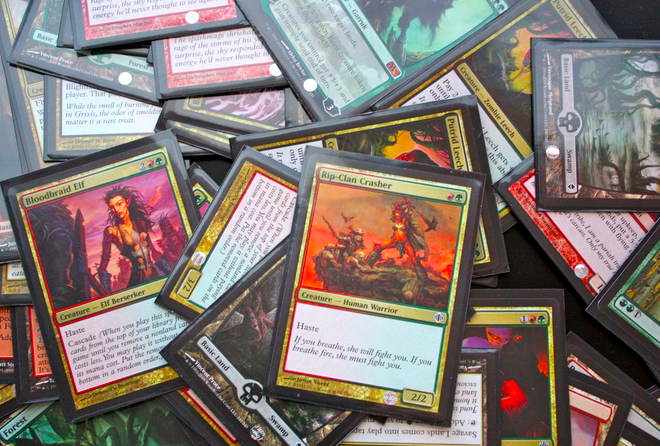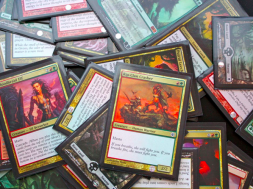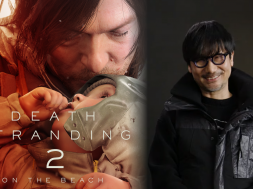
Opinion: Crime And Punishment In Professional Gaming

On May 10, 2015 during a Magic the Gathering Grand Prix in Atlantic City, pro player Zachary Jesse qualified for the top 8 of the tournament. This was followed by a tweet from Drew Levin, a Star City Games contributor, that read “Quick reminder: Zach Jesse is a literal rapist who got away with serving three months of an eight year plea deal” and with it a link to a 2004 news article from a local news website about Jesse‘s previous conviction. Wizards of the Coast quickly responded, implementing a ban until 2049 on Jesse from participating in any event and having his Magic Online account valued and then shut down.
Before I go any further, I want to clarify a few things. This article is about my views on games companies, both physical and digital, and their prerogative to implement bans on players. The main question I’m asking is: Do the developers and creators have the right to decide what crimes constitute banning periods or should the fact that they have served their time through the judicial system prove punishment enough? For context, the ‘lifetime’ ban on Jesse from Wizards of the Coast comes with numerous elements for debate, and I want to go through them from looking at other players with criminal histories, to the company morals itself. I am not here defending a convicted sex offender. I am also not here saying Wizards did the right or wrong thing, but I feel like there needs to be more clarity on the subject.
 As for other players with criminal histories, in 2012, Patrick Chapin was inducted into the Magic the Gathering Hall of Fame. This is obviously a prestigious title for any player and to get it they have to have contributed hugely to the promotion of the game, while actively helping the community as well. Chapin was regarded as one of the most friendly, approachable and personable members of the professional Magic community. He also served time for selling ecstasy in large quantities. Chapin was convicted, jailed and released and went on to become one of the greatest Magic players of all time.
As for other players with criminal histories, in 2012, Patrick Chapin was inducted into the Magic the Gathering Hall of Fame. This is obviously a prestigious title for any player and to get it they have to have contributed hugely to the promotion of the game, while actively helping the community as well. Chapin was regarded as one of the most friendly, approachable and personable members of the professional Magic community. He also served time for selling ecstasy in large quantities. Chapin was convicted, jailed and released and went on to become one of the greatest Magic players of all time.
This does beg the question, though, why does one crime garner a lifetime ban of 11 years after the conviction and sentencing, while another is swept under the rug and barely mentioned? Now, obviously the crimes committed were very different; one a deplorable violation of another person’s human rights, the other a trafficking of illegal substances. But the decision on behalf of Wizards of the Coast seems, at least in my eyes, like it doesn’t add up. Both players have rehabilitated themselves since their convictions, both players have clearly brought something to the game in order to achieve the ranks that they have. So why put one on a pedestal and the other in a metaphorical holding cell?
Wizards of the Coast are a wing of Hasbro Interactive, one of the biggest family games companies in the world. There is a moral obligation by that company to maintain its image as such, so yes, on the one hand I believe there should be sanctions placed on players with past criminal convictions. The fact that Magic is primarily played in the physical form, as in, at conventions, tournaments and in shops all around the world, with real people sitting across from you, there is a certain element of safety and security that organisers would like to enforce.
So what about a screening system for players entering Grand Prix tournaments that bans players with a criminal record? Well, that would require huge manpower and some would argue breaches the right to privacy of players, and also doesn’t account for the scope of a crime. Say a player was caught drinking and driving and crashed a car. Should they be banned from entering a card game tournament? Well, that sounds a bit mad, so what if we scaled it down then to players who have faced jail time? Obviously that minimises the amount of bans that Wizards would have to enforce, but say there are two players who are now serving bans from official events; one for tax evasion, and one for assault and battery; is that really fair? Does the crime have to be against another person in order to justify a ban, or have we now narrowed it down too specifically?
Well, that sounds a bit mad, so what if we scaled it down then to players who have faced jail time? Obviously that minimises the amount of bans that Wizards would have to enforce, but say there are two players who are now serving bans from official events; one for tax evasion, and one for assault and battery; is that really fair? Does the crime have to be against another person in order to justify a ban, or have we now narrowed it down too specifically?
So let’s talk about what does work. A ban from official organised tournaments is fair after a criminal conviction, but not for life. If a company is going to implement such a system, they have to make it transparent. A case by case basis doesn’t work in that environment not for a game the scale of Magic The Gathering. They have to account for players who have rehabilitated after serving their time with the legal system of the country in which they were convicted. Over a decade passed since Jesse‘s jail time and since then he has not re-offended. So why implement a ban after a single tweet stirred up a storm of controversy; and why too should they be banned from playing casually online? Is this just a knee jerk reaction from Wizards to save face or did they protect their community?
This is simply my take on the current and very complicated situation, but I would love to hear everyone else’s views because this is not something that any one person will have the right ideas about. Voice your opinion in the comments below.










